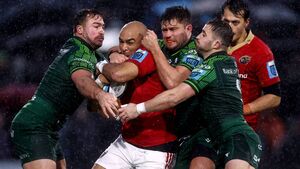Connacht takes bold move into GAA heartland

Munster's Simon Zebo is tackled by Shayne Bolton, Dave Heffernan and Caolin Blade of Connacht during the clash of the teams in the BKT United Rugby Championship at The Sportsground, Galway earlier this year. The likely game between the same teams at Hastings Insurance MacHale Park, Castlebar, in March 2025 could see Heffernan return to the venue where he once won a Mayo U16 'A' Football Championship title as joint captain of Ballina Stephenites. Picture: INPHO/Ben Brady
There was a time when the thought of a rugby ball finding its way into MacHale Park would've been scorned by both the GAA and rugby fraternities. The GAA has long been known for its resistance to other sports in the last, but the IRFU has historically been just as conservative – particularly when compared with other rugby unions around the world.
After all, back in the 1980s, the IRFU, with all the predictability of an old-school prop at an all-you-can-eat buffet, famously opposed the idea of a Rugby World Cup.
“Why tamper with tradition?” went the supposed thinking that echoed across mahogany-clad committee rooms at the time. Rugby knew its place – and it wasn’t anywhere near a GAA pitch in the West of Ireland.
Fast forward to 2024, and the same sport that once viewed expansion with suspicion is now flirting with the idea of wooing new audiences to the sport. Connacht’s decision to host their interprovincial clash against Munster at MacHale Park doesn't have to be merely a logistical necessity while the Sportsground undergoes its makeover. It can also be seen as a statement of intent from the alickadoos that should be applauded.
This move by Connacht is part of a broader trend in Irish rugby, as all three other provinces have recently embraced GAA grounds to host marquee fixtures. Munster led the way with their headline-grabbing clashes against a South Africa XV and the Crusaders in Páirc Uí Chaoimh. Leinster followed suit, opting to play a number of games in Croke Park this season as the RDS undergoes redevelopment, while Ulster staged a pre-season fixture at Kingspan Breffni in Cavan last year. The move to MacHale Park carries a similar intent: to prove that the sport has a place, even in counties where Gaelic football reigns supreme. But one question remains unanswered: is this trend simply about novelty and convenience, or if it’s a genuine effort to establish rugby as a prominent sport outside its heartlands?
Connacht has always embraced its place as the underdog of Irish rugby – it’s a province that thrives on doing more with less. It continues to exist in the shadow of its wealthier, more decorated rivals, and at stages has scrapped for its very survival. But the province has also grabbed opportunities when they came knocking. They scooped up Pat Lam at a time when they were the whipping boys of the domestic league, and a Pro 12 title soon followed. They have also proved that they have an eye for developing unsung talent, with Bundee Aki and Mack Hansen arriving from the Antipodes to become Irish superstars.
The next stage of their journey must be copperfastening their status as a provincial team, as opposed to a side from College Road. To do that, MacHale Park should only be the catalyst for Connacht taking this momentum further. A roadmap for regular games and events across the province – from pre-season friendlies to open training sessions – could embed rugby deeper into the fabric of the west. That seems like the perfect next step in this needed evolution.
The timing is perfect, too. Mayo now has its own rugby hero in Caelan Doris, a man who has risen to become one of the brightest lights in international rugby. His journey is one that offers proof that rugby and Mayo do not have to be suspicious strangers of one another. So next year’s game against Munster isn’t just about filling seats for one game; it’s about planting seeds for future generations, and perhaps inspiring Doris’ successor.
The province could perhaps also take the game on the road, bringing pre-season friendlies, open training sessions, and fan engagement events to towns across the West over the coming years. Expanding beyond the traditional stronghold in Galway City offers obvious benefits. A larger and more geographically diverse fanbase strengthens the team’s identity as a provincial side and ensures that Connacht truly represents all five counties, rather than being perceived as Galway’s team with a provincial label. That distinction is vital, not just for optics but for creating a deeper and more resilient connection with communities that may not currently feel part of the rugby story.
There are practical benefits, too. The economic model of professional rugby increasingly relies on ticket sales, sponsorship, and community engagement. Connacht cannot afford to stagnate while its rivals in Leinster, Munster, and Ulster continue to grow their bases. By reaching out to provincial towns, Connacht is effectively expanding its market, bringing the game to new potential lifelong supporters. For a province that has always operated on tighter budgets, the value of this growth cannot be overstated.
Perhaps most importantly, a broader fanbase helps futureproof the sport in Connacht. Rugby’s current popularity may not last forever, especially if Ireland’s golden generation fades or the national team’s fortunes take a dip. In that context, creating a passionate and invested community of fans outside Galway is simply good business.
The game at MacHale Park could be the beginning of this process, the catalyst to a sustained effort to bring the professional side of sport to the rest of the province. In many ways, the game at MacHale Park will serve as a reminder of just how far rugby has come. From a sport once defined by its conservatism, it is evolving into something more ambitious and inclusive. The decision to bring rugby to Castlebar, to a place where GAA has been king for over a century, is a reflection of that progress. It shows a willingness to challenge old boundaries of exclusive and reach for something new outside comfort zones.
This is yet another small but significant step in ensuring the game belongs to everyone, no matter where they’re from.



